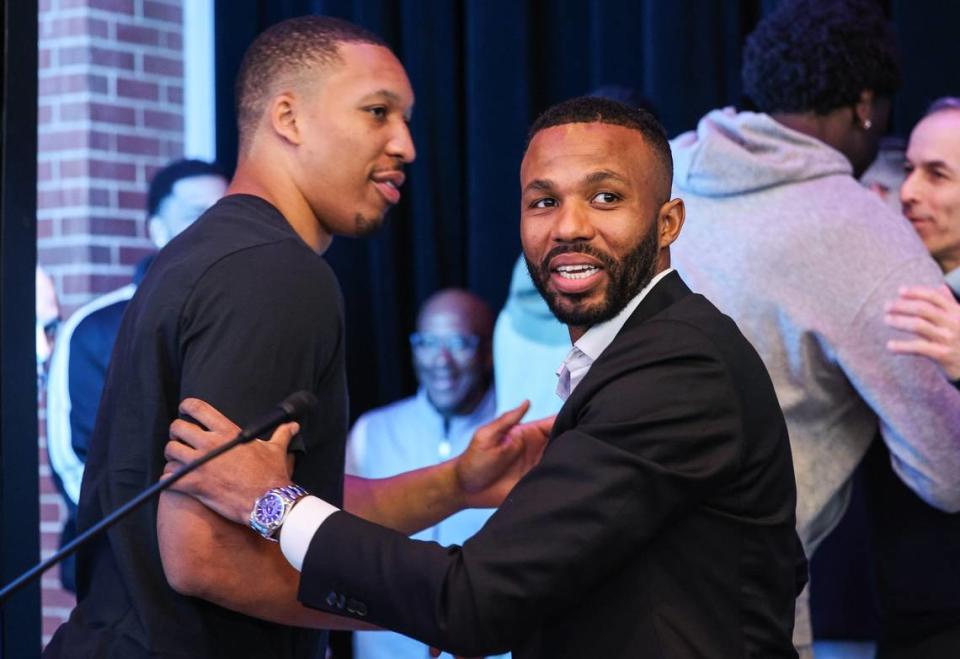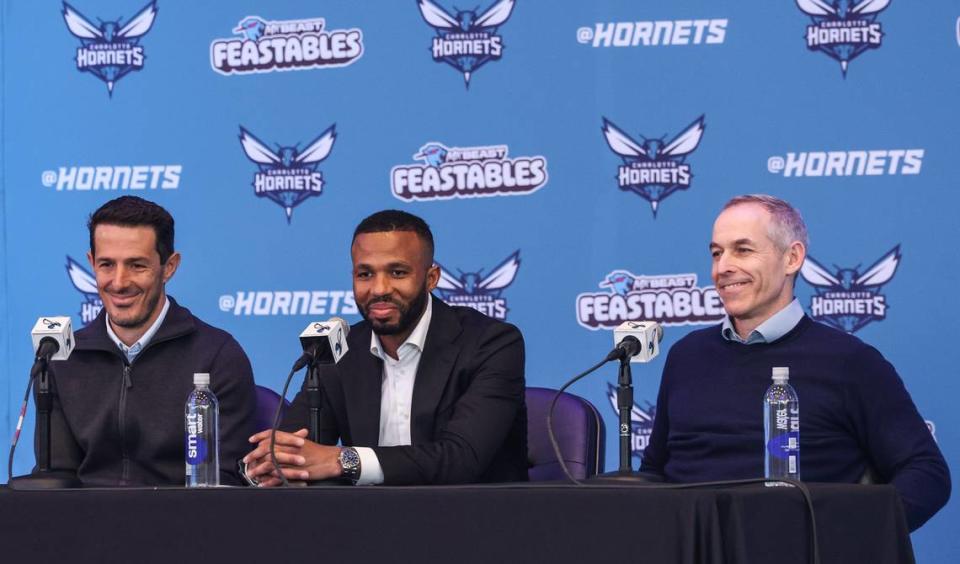Exclusive: New Hornets VP Jeff Peterson on LaMelo Ball, Miles Bridges, Steve Clifford
- Oops!Something went wrong.Please try again later.
- Oops!Something went wrong.Please try again later.
- Oops!Something went wrong.Please try again later.
After shaking a few hands and accepting some congratulatory messages from a host of well-wishers, Jeff Peterson settles in for a brief break.
The Charlotte Hornets’ new vice president of basketball operations takes a seat in the underbelly of Spectrum Center inside the Crown Club, a place that will be re-imagined this summer during the arena’s two-year renovation project. It’s probably the perfect atmosphere for Peterson at this moment, since majority co-owners Rick Schnall and Gabe Plotkin have given him the task of revamping the franchise and the NBA’s longest playoff drought.
He has a second to reflect on the whirlwind he’s experienced over the past week, going from an assistant general manager with the Brooklyn Nets to becoming the Hornets’ chief day-to-day decision maker. There’s a pinch-me vibe hovering around Peterson, whose smile seems as long and wide as the Catawba River.
“Honestly, it’s still a little bit surreal, quite frankly,” Peterson told The Observer. “I think most of the times when change happens like this in the front office, it’s usually at the end of the season and you have some closure and a little more time to prepare. But this happened quickly and as I said (at the press conference), I think it is a blessing in a lot of ways because it just gives me a little more time to evaluate.
“So, it’s been a lot, but I’m thankful. I’ve got some great people around me that’s been holding my hand and guiding me into where I need to be,”
Peterson injects a breath of fresh air into an organization that has become stale and stagnant. Multiple sources throughout the league and within the Hornets suggested to The Observer that a change was needed to shake things up, and Charlotte did that by moving Mitch Kupchak into an advisory position following the NBA trade deadline last month, relieving him of his daily duties after the Hornets didn’t produce an appearance in the 16-team playoff field since he took over in 2018.
Peterson’s ties to Schnall date back to their days together in Atlanta when Schnall was a partial owner with the Hawks prior to buying a majority stake of the Hornets in August, and Peterson was Atlanta’s assistant general manager. The 35-year-old is considered one of the most promising rising executives among league circles, and several sources have indicated the Hornets got it right by bringing Peterson on board.
“Man, I’m so fortunate,” Peterson said. “Only reason I’m sitting in this seat is because I’m blessed to have two amazing parents that are still here, and just the people that have helped me throughout my career. So, I’m excited. People speak about my age and things like that, but I look at it as an incredible opportunity. It’s so much fun to be able to go through this process with a group of people that you enjoy.”
Following his introductory press conference, The Observer sat down with Peterson to get his take on how he plans on turning the franchise into a perennial winner, LaMelo Ball’s skill set and health, Miles Bridges’ future and other topics.

Roderick Boone: You mentioned the unusual nature of this move happening in March. How will starting this role now give you a head start on what you want to accomplish leading into the offseason?
Jeff Peterson: Yeah, like I said I think it’s an incredible blessing to have these extra, 20, 21 games, a few weeks left in the season to evaluate. And that’s players, roster, the staff — all of it. I’ll look at it as, yeah, maybe it’s a small sample size, but it’s better than nothing. So, I’m excited to have this opportunity.
On Lamelo Ball, Miles Bridges
RB: What are your thoughts on LaMelo Ball and how do you go about keeping him healthy moving forward?
JP: The healthy part, this is my second day so I’ve got to get here and evaluate. He’ll be back soon, is what I’m thinking. I’m excited about LaMelo man. The size, the shooting, the passing, his vision. The way he likes to get others involved. That’s what I like to see in point guards, to control the game. Again, it’s not about him. He also has room to improve, he’s still young. So, we’ve talked a lot about player development, being a staple of the organization and I think all those guys, they’re young and they’ve got a ton of upside.
RB: Miles Bridges is an impending free agent and he’s told me more than once that he wants to stay with the Hornets. What is your impression of him so far and what have people said about him?
JP: I got to spend a little time with him (Tuesday). So, he’s enjoyable person to be around. Great smile. We had some great conversations. But first and foremost, the guy’s durable. He is so robust. He wants to play every game, which quite frankly, you don’t see that in this NBA any more. So I’m excited about that, a guy that wants to compete night-in and night-out. But his game is impressive. He can shoot, he can guard multiple positions, he’s unselfish. So, I like Miles.
RB: How will your connections around the league, and knowing agents and other executives assist you?
JP: It’s an incredible asset to have because nothing gets done in this league without relationships. Signing a free agent or trying to help position yourself better in the draft, with an agent because you want a particular player, or just doing a simple trade with a colleague around the business. So, I think it’s all about relationships and obviously some are going to be stronger than others.
But quite frankly, that’s why I tend to be pretty intentional with how I build the staff, the front office staff. Because I may not have the best relationship with someone — or any relationship with someone — but I think my colleague will be able to do it. If that gets the deal done, that gets the deal done.
RB: As it relates to compiling your staff, how will you decide who stays and goes within the front office structure? Do you have some people in mind already who you want to bring in?
JP: I think it’s part of this evaluation period. I’m going to evaluate the staff. I do think there’s some really really talented people in that group. I met them now, but previously before getting here I hadn’t met all of them. So, I’m excited to get to know them. We’ll add to the group. For sure we’ll add to the group. But You’ll hear me say this a million times, ‘I can’t do this job all by myself. So, I need a staff that’s excited, that’s passionate, loyal, I can trust that wants to be here and help build.
Making Hornets the ‘premier franchise’
RB: You said several times on the dais that you want the Hornets to be the ‘premier franchise’ in the NBA. How do you go about doing that and making this a destination that players want to come to?
JP: I think it’s probably a little cliché, but literally it’s one step at a time. I’ve seen certain franchises, when you try to skip steps, ultimately you don’t lay that foundation and ultimately it ends up being a failure or a disaster. It doesn’t turn out the way you want it to be. So literally one step at a time. We’re going to try to show up every day, be a little bit better, get better in the areas that we need to get better — whether that’s on the court, off the court — being intentional with our details. (Be) process oriented. I can’t give a timeline on it, but hopefully in some years from now we’re in the playoffs and shaving success. But it’s sustainable success.
RB: How will you ensure you don’t skip any steps and how does coming from an organization like the Nets, where draft capital was used to help construct the roster but could have long term implications, help you here with the Hornets?
JP: I think it comes back to staffing and our process, being able to have the discipline to say no. Quite frankly, I need people to tell me no. And I want that, I welcome that. I want disagreements, I want debates, because sometimes we are human. You’re excited and you’re like, ‘Maybe we should go for it now.’ But (it’s) just having the right staff around me to continue to push and challenge. We can have those hard discussions and ultimately keep that vision aligned in terms of what exactly we want to be. We can’t have anything detract from that vision.
History with Steve Clifford
RB: You know Steve Clifford from your days with Brooklyn when he was a consultant. How will that assist you in your evaluation of him considering the team hasn’t been fully healthy in his two-plus seasons as coach?
JP: The good thing is, I’ll go back to character. I know who he is as a person. I feel so comfortable with that aspect, and I’m just fortunate to have that already built in because we had a relationship. So, it’s not like I need to take time to get to know him as a human and what his values are and things like that. So, I look at that as a benefit. Look, he can coach. Cliff can coach. So we’ll take time to evaluate the whole thing the rest of the season.

RB: As an African-American, there are not many in your position. How does that make you feel, knowing how difficult it is to reach this level and there aren’t a whole lot of people with your background and upbringing in this role?
JP: I’m incredibly grateful and I think when you take a step back and look at the people who came before me … and not just in the basketball industry — in life. They’ve paved so many different roads for me to be sitting here quite frankly. Take basketball out of it. It’s just life. The amount of sacrifices my grandparents had, my family had and so many African-Americans had, again, it just allows me to sit in this seat.
So, when you tilt it back towards basketball, the Wayne Embrys, Masai (Ujiri) has been incredible to me. There’s a ton of African-Americans, whether it’s at the GM level or scout level, whatever it may be. But I think it’s important first and foremost to give credit to those people who came before us.
RB: You brought up NBA Jam and wearing the Hornets’ teal starter jacket when you were younger. How driven are you to bring a winning product here and re-energize a fan base that’s starving for something to cheer about consistently?
JP: That’s what I wake up every morning (to) now and that is it. How are we going to figure out how to put a product on the floor that these fans are excited night-in and night-out. And I’ve seen it before, in different situations. They are so passionate, and not just Charlotte, but the Carolinas in general. I’ll keep saying it: ‘They’re loyal, knowledgeable, passionate.’ So when I get up every morning, that’s my why. Like how am I going to make these fans happy?

